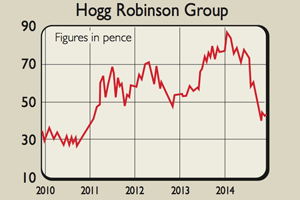Gamble of the week: A turnaround travel operator
Investing in this corporate travel operator is certainly a risky play, says Phil Oakley. But its turnaround strategy might just pay off.
Get the latest financial news, insights and expert analysis from our award-winning MoneyWeek team, to help you understand what really matters when it comes to your finances.
You are now subscribed
Your newsletter sign-up was successful
Want to add more newsletters?

Twice daily
MoneyWeek
Get the latest financial news, insights and expert analysis from our award-winning MoneyWeek team, to help you understand what really matters when it comes to your finances.

Four times a week
Look After My Bills
Sign up to our free money-saving newsletter, filled with the latest news and expert advice to help you find the best tips and deals for managing your bills. Start saving today!
Rising stockmarkets have made it much harder to find very cheap shares over the past year. When you do stumble across something that looks cheap, there is often a good reason why it's cheap.
So finding a 'gamble' candidate for this column often involves identifying a company that has one or two big problems that have depressed its share price. If the problems can be resolved, then anyone who buys in now might make a nice profit from the recovery.
But if the problems can't be sorted out, then the losses may keep stacking up. That's why it's a gamble, of course!
MoneyWeek
Subscribe to MoneyWeek today and get your first six magazine issues absolutely FREE

Sign up to Money Morning
Don't miss the latest investment and personal finances news, market analysis, plus money-saving tips with our free twice-daily newsletter
Don't miss the latest investment and personal finances news, market analysis, plus money-saving tips with our free twice-daily newsletter
And this week's candidate looks like a very risky proposition indeed. Hogg Robinson (LSE: HRG)is a corporate travel agent that makes most of its money organising travel schedules for its clients' staff.
Until 2014 it had been doing quite well, with dividends rising by 70% since 2010. This year has not been so kind the shares have more than halved since peaking in January.
Why? It looks like the company's cost base is out of kilter with how it generates its income. As with any high-street travel agency, more bookings are taking place over the internet. But Hogg Robinson had not expected so many of its clients (nearly half) to switch so fast. This left it with too many offices and staff burning a hole in its profits.
The good news is that this problem looks like it can be dealt with. Offices are being shut. More than £20m in cost savings is being targeted over the next three years. What's even more encouraging is that revenues are holding up reasonably well. It has kept hold of most of its existing clients and has won more business than it has lost.

Cash generation is good, and debt fell by more than a quarter between March and September this year. But the company's massive pension-fund deficit could be a problem.
At £189m, it dwarfs the market value of the shares (£137m) and could threaten the solvency of the company if times get very tough. This combined with the subdued trading performance this year explains why the shares look so cheap.
They trade on just over six times earnings and offer a dividend yield of 5.2%. That dividend looks safe for now. I won't deny it the shares could be a classic value trap (a stock that looks cheap, but ends up continuing to slide). However, it's making a lot of effort to get its house in order and the shares could at least be due a bounce.
Verdict: very risky buy at 42p
Get the latest financial news, insights and expert analysis from our award-winning MoneyWeek team, to help you understand what really matters when it comes to your finances.
Phil spent 13 years as an investment analyst for both stockbroking and fund management companies.
-
 How to navigate the inheritance tax paperwork maze in nine clear steps
How to navigate the inheritance tax paperwork maze in nine clear stepsFamilies who cope best with inheritance tax (IHT) paperwork are those who plan ahead, say experts. We look at all documents you need to gather, regardless of whether you have an IHT bill to pay.
-
 Should you get financial advice when organising care for an elderly relative?
Should you get financial advice when organising care for an elderly relative?A tiny proportion of over 45s get help planning elderly relatives’ care – but is financial advice worth the cost?